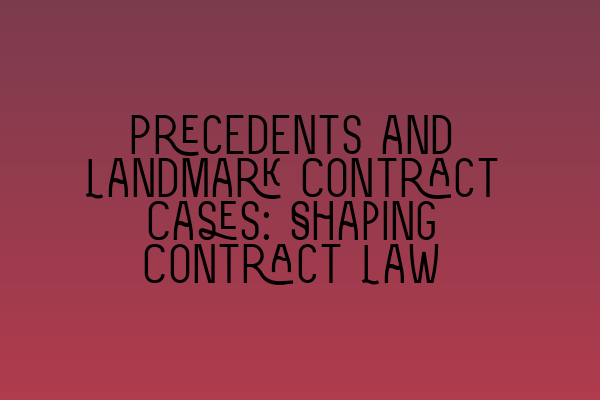Precedents and Landmark Contract Cases: Shaping Contract Law
Contract law is a fundamental aspect of any legal system, governing the agreements and obligations between parties. Over time, the development of contract law has been shaped by precedents and landmark cases, which have set important legal principles and provided guidance for future contractual disputes. In this article, we will explore some significant precedents and landmark contract cases that have had a lasting impact on contract law.
The Doctrine of Precedent: A Guiding Principle in Contract Law
The doctrine of precedent is a fundamental principle in contract law, which holds that lower courts must follow the decisions of higher courts in similar cases. This principle ensures consistency and predictability in the interpretation and application of contract law. By examining past decisions, lawyers and judges can anticipate how courts are likely to rule in similar future cases.
One landmark case that has contributed to the development of the doctrine of precedent is Carlill v Carbolic Smoke Ball Co Ltd. In this case, the court established the principle that a unilateral offer can be accepted by performance, even in the absence of direct communication between the parties. This precedent has played a crucial role in shaping the interpretation of contractual obligations and acceptance in contract law.
Landmark Contract Cases: Shaping Legal Principles
Landmark contract cases have also played a pivotal role in shaping legal principles that govern contractual relationships. These cases often involve unique facts and complex legal questions, leading to decisions that have far-reaching implications for contract law.
Hadley v Baxendale is one such landmark case that has had a significant impact on contract law. In this case, the court established the rule that damages for breach of contract should be reasonably foreseeable by both parties at the time of contracting. This principle, known as the “Hadley rule,” has become a foundational concept in assessing the recoverability of damages for breaches of contract.
Another notable case is OLA v Chedid, which tackled the issue of privity of contract. The court ruled that a third-party beneficiary to a contract could enforce the terms of the contract, even though they were not a party to it. This case expanded the scope of contractual rights and obligations beyond the traditional privity concept, leading to significant changes in contract law.
Implications for Contractual Disputes Today
The precedents and landmark cases discussed above have had a profound impact on contract law, and their implications continue to shape contractual disputes today. Understanding these influential cases can provide valuable insight and guidance when dealing with contractual issues.
For example, in a breach of contract dispute, lawyers may refer to the principle established in Hadley v Baxendale to determine the appropriate measure of damages. By demonstrating that the damages were reasonably foreseeable at the time of contracting, a party can strengthen their legal argument for seeking compensation.
Similarly, the precedent set in Carlill v Carbolic Smoke Ball Co Ltd can be relied upon to support the acceptance of unilateral offers through performance, even without explicit communication from the offeree. This precedent provides clarity on the acceptance requirement in contract law, assisting parties in navigating contractual obligations.
Conclusion
Precedents and landmark contract cases are pivotal in shaping and developing contract law. By examining past decisions, legal professionals can gain insight into how courts have interpreted and applied contractual principles, ensuring consistency and predictability in the resolution of contractual disputes. The cases discussed in this article, such as Carlill v Carbolic Smoke Ball Co Ltd and Hadley v Baxendale, provide valuable guidance and principles that can be applied in modern contract law.
For more information on topics related to contract law, mentorship for aspiring solicitors, legal challenges and pitfalls, the Solicitors Qualifying Examination (SQE), and alternative dispute resolution, please refer to the following articles:
- Mentorship for Aspiring Solicitors: Nurturing Talent in the Legal Field
- Legal Challenges and Pitfalls: Navigating the Complexities of the Legal System
- Demystifying the Solicitors Qualifying Examination (SQE): What You Need to Know
- Mentorship for Aspiring Solicitors: Finding Guidance on Your Legal Journey
- Exploring Alternative Dispute Resolution: An Effective Approach to Legal Conflicts
